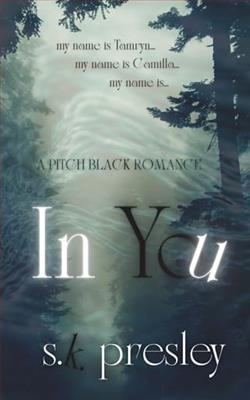Page 44 of So Far Gone
“Well, I’m involved, Joanie.”
“No. Not like that.”
“He needs my help.”
She reached for the soft rifle case. “He doesn’t need this.”
Brian pulled the case back toward himself. “Joanie, please. Can we not talk about this here? In front of them?” He pulled her by the arm back to the bedroom, the door closing behind them.
Grandpa Rhys came inside then. He lingered at the bar, took a half sandwich from the plate Joanie had prepared, and looked from Leah to Asher. “How are you guys doing?”
“Fine,” Leah said. Asher noticed that Leah hadn’t had much to saysince they’d left the Rampart. She sometimes got into moods like this. Their mom said it was “adolescence,” but sometimes he thought Leah was just kind of a b***head.
“You won’t tell Mom, right?” Leah said to Grandpa Rhys. “About what I told you?”
“What did you tell him?” Asher asked.
Leah spun on him. “Asher! It’s none of your business!”
Yes, Asher concluded. Leah was being a total b***head.
“No, I won’t say anything, Leah,” Kinnick said. “Don’t worry. Right now, Brian and I are going to run into town to check on my friend at the hospital. You two stay here with Joanie. We’ll be back in a few hours, and tomorrow, we’ll go get your mom.”
Leah opened her mouth to say something but stopped.
“Why does Brian have a rifle?” Asher asked.
“For turkeys,” said Joanie. She was coming out of the back bedroom, Brian behind her with the rifle case. “It’s spring turkey season. You kids like turkey?”
“Not really,” Asher said. “I like—”
“Asher—” Leah said again.
“I do like pressed turkeyslices,” Asher said. “In sandwiches.” And then, as if he couldn’t help himself, “But I like ham better.”
“Well, he’ll try to shoot a pressed turkey,” Joanie said. “Or a ham.”
Brian nodded at Joanie, who mouthed some words to him.
“Love you, too,” Brian said. Then: “You ready, Rhys?”
Grandpa Rhys nodded. “Yeah. Okay.” He looked back at the kids, as if there was more to say. “Okay,” he said again, then turned for the door. “Okay.”
***
Kinnick stepped warily through the double sliding doors, half-expecting to see Sheriff Glen Campbell, or the dismissive Spokane police sergeant,or maybe a full SWAT team ready to arrest him for kidnapping his grandchildren. Instead, he smelledhospitaland immediately thought of his poor mother (embolism postsurgery, only forty-four), and years later, the claustrophobic and helpless feeling of coming to various emergency rooms as a parent. (Bethany at six, falling off a slide at school and needing five stitches, at thirteen, coughing up blood for no apparent reason, at seventeen, a broken clavicle from a car accident with friends.)
Every chair in the Sacred Heart Emergency Room waiting area was filled with some manner of suffering—twitching addicts and bleeding head wounds and people struggling to simply breathe. Just inside the doors, a triage nurse was helping a skinny barefoot girl with a screaming, thrashing toddler, who was trying to squirm out of his footie pajamas, or maybe out of his skin. The child let out a harrowing scream as Kinnick stood there, unsure if he should try to help.
“Come on, Mom,” the nurse was saying, “you need to keep moving. Let’s get your boy back here and start fixing him up.” But the young mother had frozen just inside the door, as if this were suddenly more than she could handle.
“He got burned,” she said.
The nurse looked over at Kinnick warily, then cocked her head slightly to look more closely at his bruised face. “Looks like you took quite a shot. Zygomatic arch?”
“So they tell me,” Kinnick said.
She nodded to a window. “Head over to intake with your ID.”















